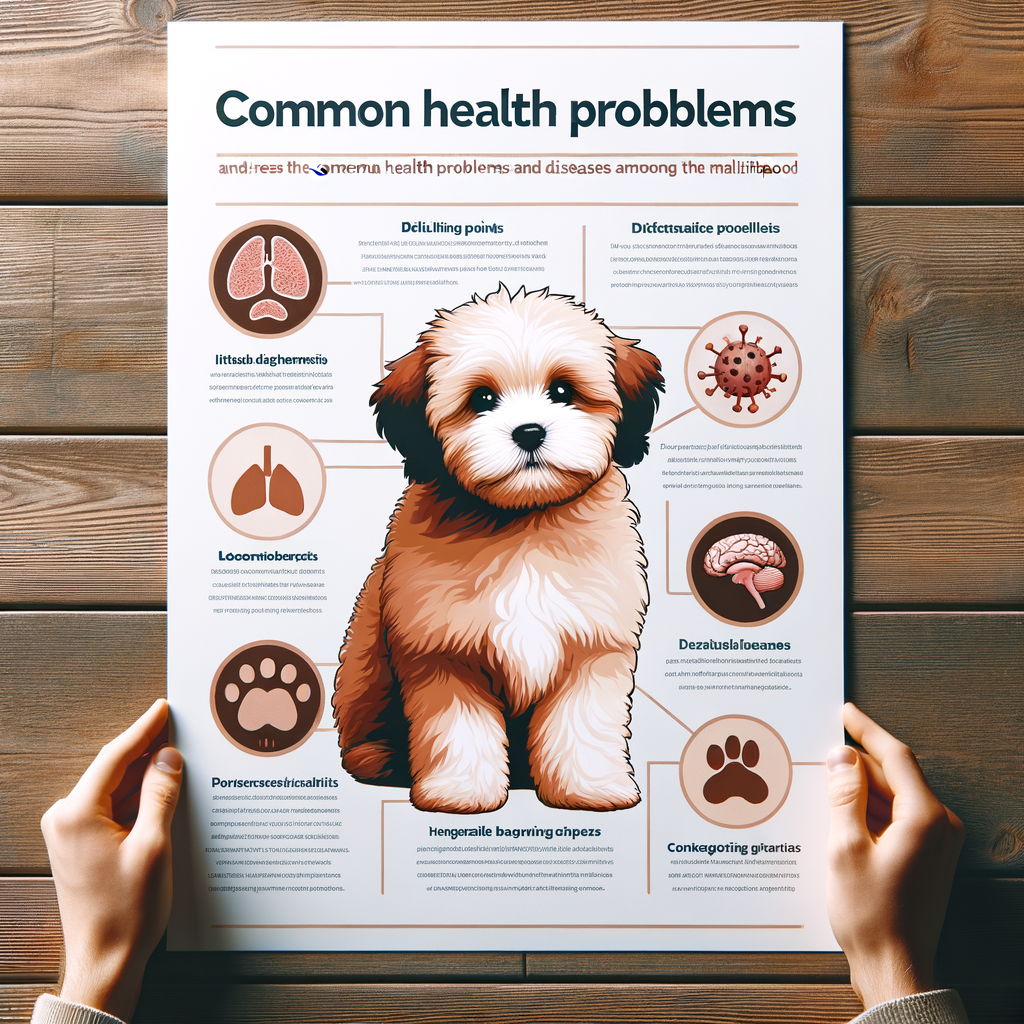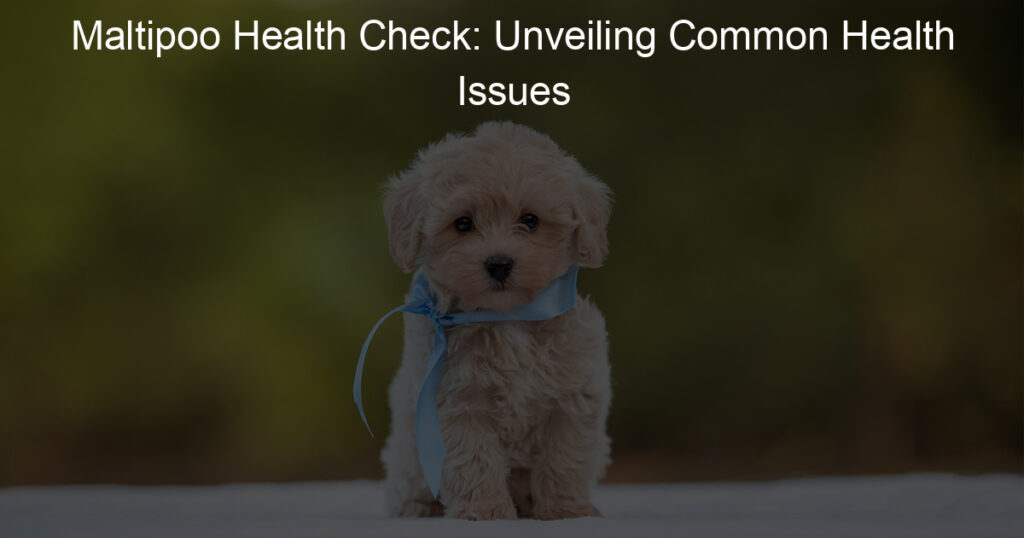
Introduction to Maltipoo Health Issues
As a Maltipoo owner or someone considering adopting this breed, it’s essential to understand the potential health issues that may arise. This knowledge will help you provide the best care for your furry friend, ensuring they live a long, healthy, and happy life.
- Overview of Maltipoo Breed Health
- Importance of Health Awareness for Maltipoos
Maltipoos, a crossbreed between Maltese and Poodles, are generally healthy dogs. However, like any breed, they are prone to certain health conditions. These can include common issues like dental problems, obesity, and skin conditions, as well as breed-specific issues like Patellar Luxation and Progressive Retinal Atrophy. It’s important to note that not all Maltipoos will get any or all of these diseases, but it’s crucial to be aware of them if you’re considering this breed.
Being aware of potential health issues is not about being overly worried or paranoid. Instead, it’s about being a responsible and caring pet owner. Understanding the potential health problems your Maltipoo may face allows you to spot early signs of trouble, seek timely veterinary care, and take preventive measures to keep your pet healthy. Regular check-ups, a balanced diet, and plenty of exercises can go a long way in preventing many health issues.
As we delve deeper into this topic, we will explore common Maltipoo health problems, how to care for a Maltipoo’s health, and real-life case studies. By the end of this guide, you will have a comprehensive understanding of Maltipoo health and how to ensure your pet’s well-being.
Common Maltipoo Health Problems
While Maltipoos are generally healthy dogs, they can be prone to certain genetic diseases. Understanding these health issues can help you take better care of your pet and ensure they live a long, happy life. Let’s take a closer look at some of the most common genetic diseases that can affect Maltipoos.
Genetic Diseases
- Patellar Luxation
- Progressive Retinal Atrophy (PRA)
- Legg-Calve-Perthes Disease
Patellar Luxation is a condition where the kneecap moves out of its normal position. It’s a common issue in small dogs like Maltipoos. Symptoms can include limping, discomfort, and difficulty walking. While it can be managed with medication, severe cases may require surgery.
Progressive Retinal Atrophy is a group of genetic diseases that cause the retina of the eye to deteriorate over time, leading to blindness. Early signs can include night blindness and dilated pupils. Unfortunately, there is no cure for PRA, but regular check-ups can help manage the condition.
Legg-Calve-Perthes Disease is a condition that affects the hip joint. It usually occurs in young dogs and can cause lameness and pain. Treatment often involves surgery and physical therapy. Regular vet check-ups can help detect this condition early and manage its symptoms effectively.
Knowing about these genetic diseases can help you keep an eye out for any signs or symptoms in your Maltipoo. Regular vet visits and a healthy lifestyle can go a long way in preventing these conditions and ensuring your pet’s well-being.
Common Ailments
While Maltipoos are generally healthy dogs, they can sometimes suffer from a few common ailments. These include White Shaker Syndrome, teething problems, and ear infections. Let’s take a closer look at each of these issues.
- White Shaker Syndrome
- Teething Problems
- Ear Infections
White Shaker Syndrome is a neurological disorder that can affect Maltipoos. It’s characterized by rapid, uncontrolled shaking or tremors, often making it look like the dog is shivering. This condition usually appears when the dog is between 6 months and 3 years old. While the exact cause is unknown, it’s believed to be related to inflammation in the brain. Treatment typically involves medications to reduce inflammation and control the shaking.
Like human babies, Maltipoo puppies go through a teething phase as they grow. This can cause discomfort and lead to problems like excessive chewing or biting. To help alleviate the discomfort, provide your Maltipoo with safe, appropriate chew toys. If teething problems persist or if your puppy seems to be in pain, it’s best to consult with a vet.
Maltipoos, with their adorable floppy ears, are unfortunately prone to ear infections. These can be caused by a variety of factors, including allergies, bacteria, or yeast. Symptoms to watch out for include scratching at the ears, head shaking, and a foul smell. If you suspect an ear infection, it’s important to seek veterinary care promptly. Regular ear cleaning can also help prevent these infections.
Remember, while these ailments are common, they are not inevitable. Regular check-ups with your vet, a healthy diet, and proper grooming can go a long way in keeping your Maltipoo healthy and happy.
Maltipoo Health Care
Keeping your Maltipoo healthy and happy involves more than just feeding them and giving them toys to play with. It requires a comprehensive approach that includes preventive measures to ensure they stay in the best possible health. Let’s explore some of these measures.
Preventive Measures
Preventive measures are actions taken to prevent diseases or injuries rather than curing them or treating their symptoms. Here are some preventive measures you can take to ensure your Maltipoo’s health:
- Regular Vet Check-ups
- Proper Nutrition
- Regular Exercise
Regular vet check-ups are essential for your Maltipoo’s health. These visits allow the vet to catch any potential health issues early, before they become serious. The vet will examine your Maltipoo, give them any necessary vaccinations, and provide advice on their diet and exercise needs. Aim for at least one vet visit per year, or more if your Maltipoo has specific health concerns.
Just like humans, Maltipoos need a balanced diet to stay healthy. This includes high-quality dog food that’s appropriate for their age, size, and health status. Avoid feeding them human food, as some can be harmful to dogs. Also, ensure they always have access to fresh water. If you’re unsure about what to feed your Maltipoo, your vet can provide personalized advice.
Maltipoos are energetic and playful, and regular exercise is crucial for their physical and mental health. Exercise helps keep their weight in check, strengthens their muscles and bones, and provides mental stimulation. Aim for at least 30 minutes of exercise a day, which can include walks, playtime, or dog sports. Remember, the type and amount of exercise should be appropriate for your Maltipoo’s age and health status.
By implementing these preventive measures, you can help ensure your Maltipoo lives a long, healthy, and happy life. Remember, your vet is your best resource for any health concerns you have about your Maltipoo.
Treatment Options
When it comes to the health of your Maltipoo, there are several treatment options available. These options depend on the specific health issue your pet is facing. Let’s explore three common treatment methods: medication, surgery, and alternative therapies.
- Medication
- Surgery
- Alternative Therapies
Medication is often the first line of treatment for many Maltipoo health issues. This could range from antibiotics for infections, to anti-inflammatory drugs for conditions like arthritis. It’s important to remember that all medications should be prescribed by a vet, and you should always follow the dosage instructions carefully. Over-the-counter medication meant for humans can be dangerous for dogs, so always consult with your vet before giving your Maltipoo any medication.
In some cases, surgery may be required to treat more serious health issues. This could include procedures to remove tumors, repair broken bones, or address heart conditions. Surgery is typically considered when other treatment options have not been effective, or when the health issue is severe. While the thought of your Maltipoo undergoing surgery can be scary, modern veterinary medicine has made many procedures safer and more effective than ever before.
Alternative therapies are becoming more popular in the world of pet health care. These can include treatments like acupuncture, massage, and herbal supplements. While these therapies can be beneficial, it’s important to remember that they should be used in conjunction with traditional treatments, not as a replacement. Always consult with your vet before starting any new treatment regimen.
In conclusion, the best treatment for your Maltipoo will depend on their specific health issue and needs. Always consult with your vet to determine the best course of action. Remember, early detection and treatment can make a big difference in your Maltipoo’s health and quality of life.
Case Studies: Maltipoo Health Issues
Let’s delve into real-life examples to better understand the health issues that Maltipoos can face. These case studies provide valuable insights into the symptoms, diagnosis, and treatment of some common Maltipoo health problems.
- Case Study 1: Maltipoo with Patellar Luxation
- Case Study 2: Maltipoo with Progressive Retinal Atrophy
- Case Study 3: Maltipoo with White Shaker Syndrome
Meet Bella, a 3-year-old Maltipoo who started limping on her right hind leg. Her vet diagnosed her with Patellar Luxation, a condition where the kneecap dislocates from its normal position. Bella’s vet recommended a combination of physical therapy and medication to manage her condition. With consistent care and treatment, Bella was able to regain her mobility and continue her playful antics.
Next, we have Max, a 5-year-old Maltipoo who started bumping into furniture and having difficulty seeing at night. His vet diagnosed him with Progressive Retinal Atrophy, a genetic condition that gradually leads to blindness. Although there’s no cure, Max’s family was able to make his environment safer and more comfortable, and Max adapted well to his condition.
Lastly, let’s look at Daisy, a 2-year-old Maltipoo who began to display uncontrolled shaking. She was diagnosed with White Shaker Syndrome, a neurological disorder. Daisy’s vet prescribed medication to control her shaking, and with regular check-ups and consistent medication, Daisy’s condition improved significantly.
These case studies highlight the importance of regular vet check-ups and early diagnosis in managing Maltipoo health issues. Remember, a healthy Maltipoo is a happy Maltipoo!
Key Takeaways: Maltipoo Health Guide
- Understanding the common health issues in Maltipoos
- Importance of preventive health care for Maltipoos
- Dealing with Maltipoo breed health issues
Maltipoos, a crossbreed of Maltese and Poodles, are generally healthy dogs. However, they can be prone to certain health issues. Some of the common health problems include Patellar Luxation (a knee condition), Progressive Retinal Atrophy (an eye condition), and skin problems. It’s important to recognize the signs of these conditions early for effective treatment. Regular vet check-ups can help identify these issues in their initial stages.
Preventive health care plays a crucial role in maintaining your Maltipoo’s health. This includes regular vaccinations, dental care, a balanced diet, and regular exercise. Regular vet visits are also part of preventive health care. They help in early detection of potential health issues, allowing for timely treatment and better outcomes. A healthy lifestyle can significantly reduce the risk of many common health problems in Maltipoos.
Dealing with Maltipoo health issues requires a proactive approach. If your Maltipoo is diagnosed with a health condition, it’s important to follow the vet’s advice and treatment plan. Regular follow-up visits are crucial to monitor your pet’s health. In some cases, lifestyle changes may be required, such as a special diet or increased exercise. Remember, your Maltipoo’s health is a lifelong commitment and requires consistent care and attention.
| Common Health Issues | Symptoms | Preventive Measures |
|---|---|---|
| Patellar Luxation | Limping, difficulty in walking | Regular exercise, maintaining a healthy weight |
| Progressive Retinal Atrophy | Difficulty in seeing, bumping into objects | Regular vet check-ups for early detection |
| Skin Problems | Itching, redness, skin sores | Regular grooming, using hypoallergenic shampoos |
Conclusion: Ensuring Your Maltipoo’s Health
As a Maltipoo owner, your primary responsibility is to ensure the health and happiness of your pet. This involves a combination of regular health checks, proper care and attention, and the early detection of health issues. Let’s delve into these aspects further:
- Regular health checks: Regular vet visits are crucial for maintaining your Maltipoo’s health. These checks help identify any potential health issues before they become severe. According to a study, dogs that receive regular health checks live on average 1.8 years longer than those that don’t. Therefore, it’s recommended to have your Maltipoo checked at least once a year, or more frequently if your vet advises.
- Proper care and attention: Your Maltipoo’s health is not just about medical care. It’s also about providing a loving and caring environment. This includes a balanced diet, regular exercise, grooming, and mental stimulation. Remember, a happy Maltipoo is a healthy Maltipoo!
- Importance of early detection of health issues: Early detection of health issues can significantly improve the prognosis for your Maltipoo. This is why it’s essential to be aware of the common health problems that Maltipoos face, as discussed earlier in this article. If you notice any changes in your Maltipoo’s behavior, appetite, or overall health, it’s best to consult your vet immediately.
In conclusion, ensuring your Maltipoo’s health involves a combination of regular vet visits, proper care, and vigilance for any signs of health issues. By taking these steps, you can help your Maltipoo live a long, healthy, and happy life.








